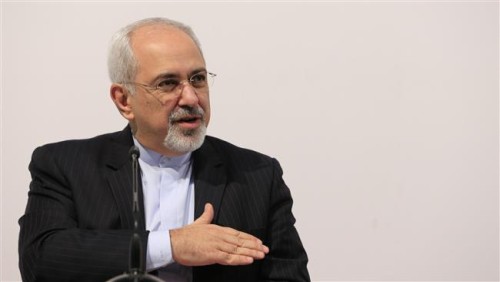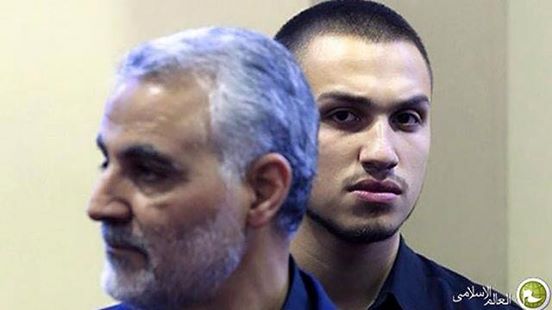LATEST: Interior Minister — West and Saudi “Hirelings” Committing Suicide With Falling Oil Prices
A week of nuclear talks between Iran and the 5+1 Powers (US, Britain, France, Germany, Russia, and China) ended on Sunday in Geneva with no apparent advance and both sides “deflated”.
The discussions began with bilateral talks between Iran and members of the 5+1, including seven hours of meetings between Iranian Foreign Minister Mohammad Javad Zarif (pictured) and US Secretary of State John Kerry, followed by three days of negotiations between the Iranian and American delegations.
On Sunday, Iran and the 5+1 met in plenary session; however, there was no sign of resolution of key issues such as Tehran’s number and level of centrifuges for uranium enrichment and the lifting of US-led sanctions.
The two sides have reportedly been trying to agree a general framework for a detailed agreement, but journalist Laura Rozen said on Sunday night that they were “deflated” after inconclusive exchanges.
Iranian Foreign Minister Zarif said on Monday that the talks had become “complicated”, while trying to show a firm line with the declaration:
There is no need for any U-turns in the negotiations. There is only a need for everybody to recognize that negotiating and putting pressure don’t go hand in hand.
Since his meeting with Kerry, Zarif has moved from optimism over a comprehensive agreement if there is “political will” to criticism of the US and its allies. He spoke on Monday of a “need to start reaching an agreement and stop insisting or hoping that pressure will resolve the issue.”
“It’s clear now that they have to respect the Iranian people’s rights,” Zarif asserted.
He then held out the olive branch that the Islamic Republic is prepared to “accept any agreement that is respectful of and reasonable and that will not prevent Iran from developing nuclear technology for peaceful purposes”.
The European Union said in a Sunday statement on the “serious and useful meetings” that the two sides “decided to meet again in early February”.
The two sides have extended interim nuclear arrangements to July 1, having failed twice last year to meet deadlines for a comprehensive resolution.
Interior Minister: West and Saudi “Hirelings” Committing Suicide With Falling Oil Prices
Iran’s accusations of a “foreign plot” behind falling oil prices are now so common that they are not news; however, Interior Minister Mostafa Pourmohammadi grabs headlines by saying the plot will be “suicidal”.
Pourmohammadi said on Sunday, “That they decrease the oil price from $100 to $40, to less than a half, in a few months is a big suicide for the West and their hirelings in the region.”
The Minister maintained that the “plot” was a further chapter in the US-led sanctions over Iran’s nuclear program: “If the enemy had succeeded in its sanctions policy, it would have never committed the suicidal act of decreasing the oil price.”
The Supreme Leader’s office used Twitter on Sunday to threaten a response to the price drop, which could cripple the Government’s budget on top of production problems and pressure from sanctions:
We can’t stay indifferent esp. that it is not just our problem; many nations get hurt far more than we do. #Oil #OPEC pic.twitter.com/Fl2IAssSe8
— Khamenei.ir (@khamenei_ir) January 18, 2015
Iran’s Football Team Warned: No Selfies With Women Fans
Iran’s national football team, currently playing in the Asian Cup in Australia, have been warned that they face punishment if they take “selfie” pictures with women fans.
The head of the Iranian Football Federation’s moral committee said:
National team players should be aware that they won’t be used as a political tool so that those who take pictures with them don’t use these photos against the players….
So according to this they should not take photos with everyone. If the players don’t respect this, we will be obliged to take action.
One female fan has tweeted pictures of goalkeeper Ali Reza Haghighi and midfielder Karim Ansari Fard posing with women.
Women are banned from attending men’s sports events in the Islamic Republic, but they are attending Iran’s games in large numbers in the Asian Cup. The Iranian team is through to the quarterfinals after a 1-0 victory over the UAE on Sunday.
(Photo: Getty)
Top Revolutionary Guards Commander in Syria Killed in Israeli Airstrike
Iran’s regime has been shaken by the killing of one of its top commanders in southwest Syria by an Israeli airstrike.
General Mohammad Ali Allahdadi of the Revolutionary Guards died when Israeli helicopters fired two missiles on vehicles in Quneitra Province near the Israeli-occupied Golan Heights.
Two of Hezbollah’s top commanders — one of them Abu Ali Tabatabai, an Iranian citizen — and several fighters were also killed. The conservative Tabnak is reporting that there were other Iranian casualties.
Allahdadi has been the Revolutionary Guards’ liaison with the Assad regime and movements in Lebanon and Palestine, including Hezbollah and Islamic Jihad, for years. In August 2010, he was put on a US sanctions blacklist for “support of terrorism”.
The Revolutionary Guards said that Allahdadi had been acting “as a military advisor to help the Syrian government and nation in the fight against Takfiri-Salafi terrorists”. It gave details on the Israeli attack, saying it was about 60 km (37 miles) south of Damascus, with two remote-controlled reconnaissance drones accompanying the helicopters.
The Guards claimed the attacks showed that “terrorists” were challenging Syria “within the framework of the policies and plans of the hegemonic system and Zionism and in coordination with leaders of the White House and the Quds occupying regime [Israel]”.
Foreign Minister Mohammad Javad Zarif condemned the Israeli attack early Monday, without acknowledging Allahdadi’s death.
“We condemn all actions of the Zionist regime as well as all acts of terror,” Zarif said. “The policy of state terrorism is a known policy of the Zionist regime.
Allahdadi is the second senior Revolutionary Guards commander killed by Israeli airstrikes in the Syrian conflict. In February 2013, General Hassan Shateri was killed when a convoy, reportedly carrying missiles and military equipment from Syria to Lebanon, was attacked south of Damascus.
Shateri was in charge of Iranian reconstruction efforts in Syria and Lebanon.
General Qassem Soleimani, head of the elite Qods Forces of the Revolutionary Guards, with Jihad Imad Mughniyeh, son of a famous Hezbollah commander and one of those killed on Sunday:



